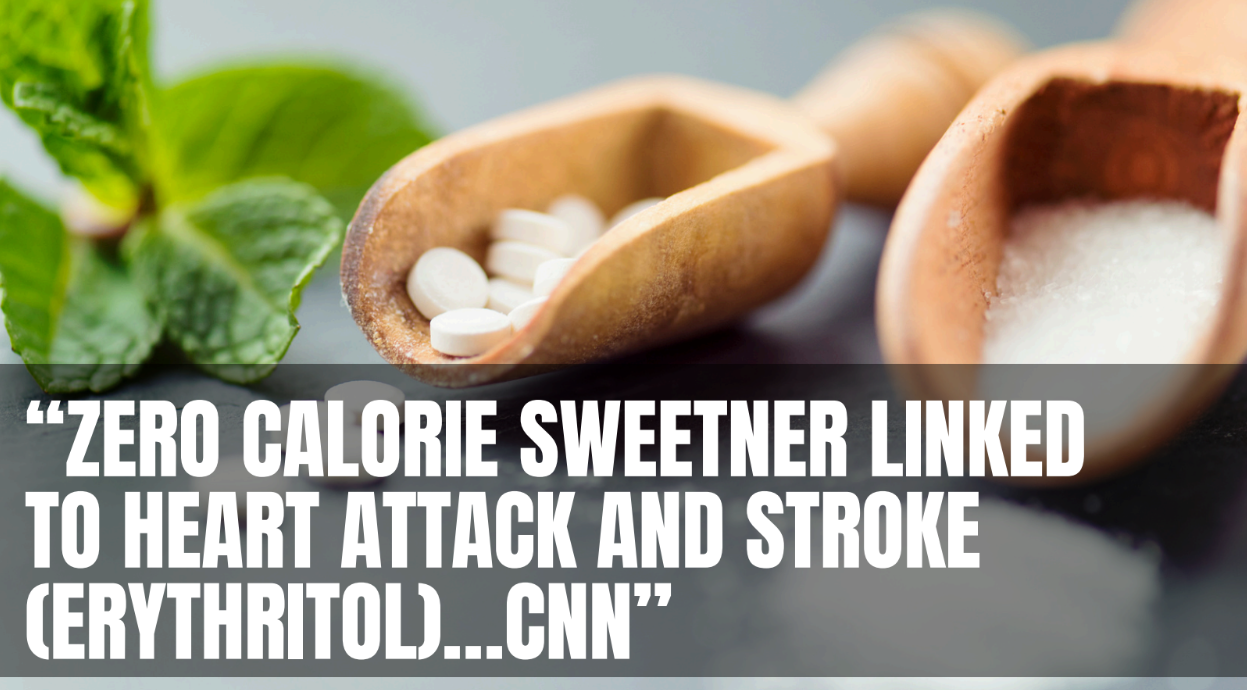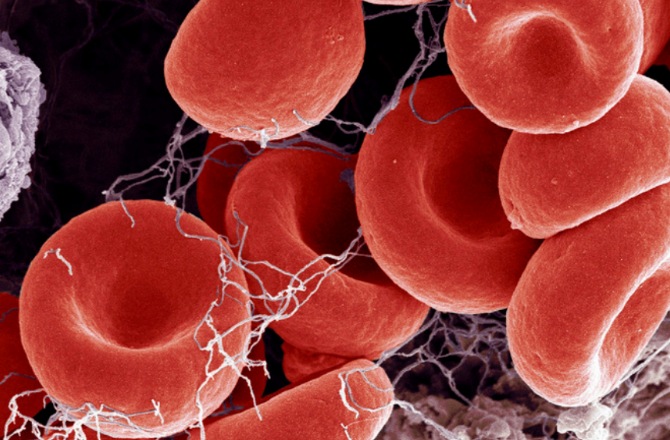
Hello friends!
This is a very early and premature capture of a sensational headline about the sugar-alcohol molecule, erythritol.
It centers around the hypothesis, based on an association that erythritol (and perhaps xylitol) which are natural sugar alcohols in
foods and made in our bodies, when or if ingested in perhaps what is “excessive”, which is not defined or qualified with any newly
proven standards by the article, can become problematic to our “cardiometabolic” health.
The article points to conspicuous “platelet aggregation” as noted in their study of the use of sweet erythritol in cardiac and Type 2
Diabetic patients.
It hypothesizes a potential concern of pathological blood clotting from the consumption of erythritol. in perhaps precipitating
cardiac and stroke events, as studied in certain aged and not particularly healthy populations, and then superimposes the frequent
consumption of “erythritol” and its long clearance time in the blood after high doses in foods as possibly a relevant and interrelated
risk factor.
An “in Vitro” study is used to demonstrate in a lab model system how erythritol plus platelet-rich blood serum may develop platelet
aggregation.
There you have it–three independent variables with no proven causation relationship –only suggested and admitted as such through
an initial concerning association.


Clotting that occurs inside blood vessels is most often a result of injury to the endothelium lining through oxidative stress, and thus,
a sequence of factors occurs well beyond just aggregation to finally form a “clot”.
As an ironic point of fact, explained later, erythritol is a very good (hydroxyl-fighting) antioxidant in mitigating oxidative stress thus reducing injury to the endothelium from dangerous and damaging oxidants.
However, spontaneous clotting is much higher in hyperglycemia, diabetics, high blood pressure, or older populations—so there is a predisposition and disparity of possible bias already in place for the study subjects.
“Hyperglycemia is associated with enhanced thrombin formation, platelet activation, and fibrin clot resistance to lysis in
patients with acute coronary syndrome”…..Anetta Undas 1, Ilona Wiek, Ewa Stêpien, Krzysztof Zmudka, Wieslawa Tracz
Abstract Objective: Acute hyperglycemia on admission for acute coronary syndrome worsens the prognosis in patients with and
without known diabetes. Postulated mechanisms of this observation include prothrombotic effects. The aim of this study
was to evaluate the effect of elevated glucose levels on blood clotting in acute coronary syndrome patients.
A “clot” in itself, is a mechanism of protection and healing, however, it can also be a source of potential and even fatal outcomes
if it is pathological and breaks off and circulates as a significant obstruction to blood flow in vulnerable areas, such as the brain and
the heart, which could lead to serious morbidity and even instant death.
That’s frightening, especially as we age, so great. and sincere concerns about anything and everything to reduce the risk of such a
consequence are highly justified and in everyone’s best interests.
To reiterate, and can’t be emphasized enough, the early study was done with already highly predisposed subjects, some already with
heart disease, high blood pressure or Type 2 diabetes consuming around 30 g or more of erythritol-which is aggressive, but as a
total daily dose, is not unreasonable.
Even the researchers remark to be careful– not to over-extrapolate this with normal people–can be very different.
There will be a prospective study with healthy subjects planned–very good and important, however, this first study was a
data-driven “retrospective” relationship, not a causation study, and its finding was explained as highly suggestive and
worthy to take seriously.
It also measured, as it thought consequential, “how long erythritol remained in the blood”, but no cause or effect was
established at this point by their study.
Regular “sugar” however in large amounts and frequency can significantly stimulate adverse clotting, glycation, high
cholesterol, and other bad things to one’s health.
So keep in mind, it’s not the intent of the researchers to persuade us to “skip sugar alcohols and consume sugar”!
Perhaps the point is to ideally establish a “dose-response” curve–that means, how much at what amount one begins to see an
actual adverse and causal event factoring in health, age, and predisposing health tendencies. As one of my scientific colleagues once mentioned, with anything we consume with frequency and in higher amounts, the “poison is in the dose”!
Every food or ingredient follows a “bell-shaped” curve where there is little problem or effect, a certain amount balances the good,
and too much creates stress on metabolism and health.
The principle of moderation and balance remains centrally axiomatic in optimal health and nutrition.
On the other hand, erythritol (and xylitol) also have very well-documented and established remarkable health properties in
moderation.
Thus, establishing a “happy zone” of safety and tolerance is always the prime directive for any kind of supplementation, unusual
food, or even regular food.
Next is an actual prospective study done back in 2018–well before the current study of our discussion and its proposed
prospective study.
“Effects of erythritol on endothelial function in patients with type 2 diabetes mellitus: a pilot study”
Nir Flint 1, Naomi M Hamburg, Monika Holbrook, Pamela G Dorsey, Rebecca M LeLeiko, Alvin Berger, Peter de Cock, Douwina
Bosscher, Joseph A Vita
Abstract
Participants (n = 24) consumed erythritol 36 g/day as an orange-flavored beverage for 4 weeks and a single dose of 24 g during the
baseline and final visits.
We assessed vascular function before and after acute (2 h) and chronic (4 weeks) erythritol consumption.
Acute erythritol improved endothelial function measured by fingertip peripheral arterial tonometry (0.52 ± 0.48 to 0.87 ± 0.29 au, P =
0.005).
Chronic erythritol decreased central pulse pressure (47 ± 13 to 41 ± 9 mmHg, P = 0.02) and tended to decrease carotid-femoral pulse
wave velocity (P = 0.06).
Thus, erythritol consumption acutely improved small vessel endothelial function, and chronic treatment reduced central aortic
stiffness. Erythritol may be a preferred sugar substitute for patients with diabetes mellitus.
With all the above discussed and with this abstract let’s double back to the contention that high, tapering off blood levels of
erythritol is necessarily worrisome as the Cleveland study seems to suggest.
–If one takes lots of Vitamin C, there will be a high and tapering off blood level until absorbed by cells and if in excess orally, will be
passed out by the bowel and kidneys. However, in the meantime, it destroys dangerous oxidants in the blood and intracellularly.
–If one consumes erythritol, there will be a high and tapering-off level until passed out by the kidneys.
However, in the meantime, it’s a very good antioxidant in the blood against hydroxyl radicals and protects the inner lining of blood
vessels against oxidative damage and stiffness –a big deal!
–Then, if one takes lots of regular sugar, there will be high hyperglycemia, and then tapering off blood level with insulin release
going wild, likely adverse glycation with proteins, induction of greater oxidative stress, and eventual damage to cell structures and
the metabolism in general.
So, the underlying point is, “tapering off blood levels” of something that is expected should not be construed as something unique,
adverse, and dangerous!
Finally, another factual morsel worth mentioning is that erythritol and xylitol, have strong anti-dental plague abilities so that mouth
bacteria, cannot form their biofilm to engender tooth decay and gum disease— rather important?
Also, xylitol enhances mineral absorption so it is considered bone and teeth healthy–indeed a good thing if you can tolerate this sugar
alcohol in small doses.
Erythritol (and all sugar alcohols) is absorbed through the intestinal brush borders, as with other sugars, as we discussed in a former
article.
